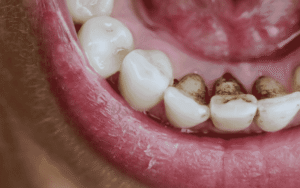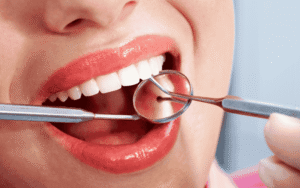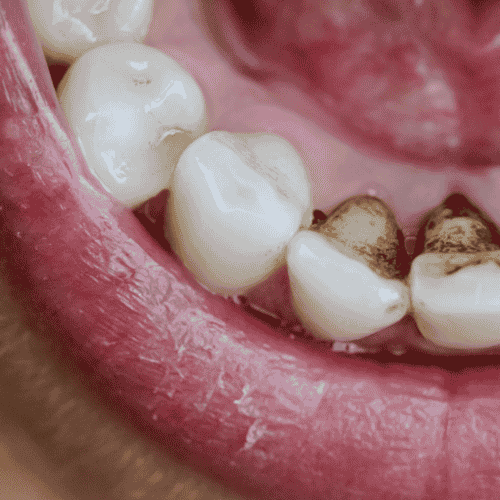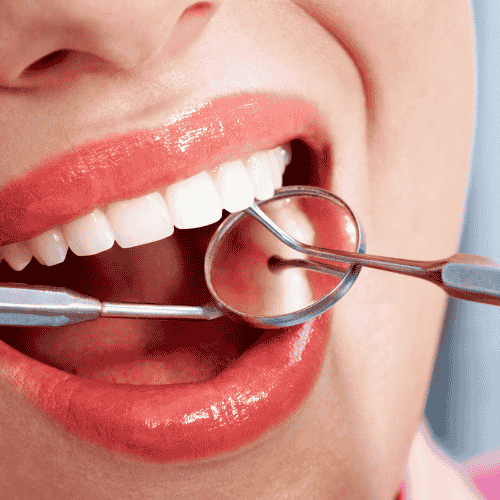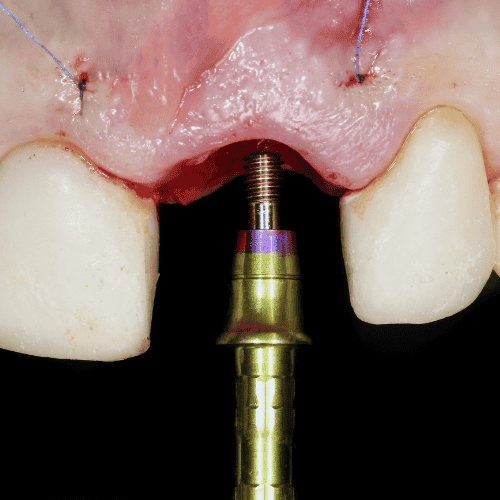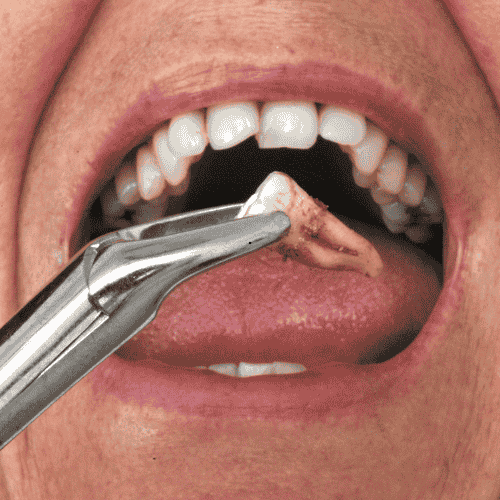Wisdom teeth removal is regular yet vital, relieving pain and preventing dental complications. Although third molar extraction is routine, recovery side effects are common. Planning for and dealing with these signs will help you get better faster. Knowing about side effects will help you feel less pain while you are getting ready for therapy or while you are recovering from it. In this article, we will discuss the most common disadvantages of removing wisdom teeth and offer advice on how to get better.
What Are the Most Common Complications After Wisdom Tooth Extraction?
Wisdom tooth extraction is a frequent dental procedure that relieves pain and prevents dental complications. As with any surgery, healing issues may occur. Understanding these side effects might help you set expectations and support proper healing.
1. Dry Socket (Alveolar Osteitis)
Dry socket is a common and painful wisdom tooth extraction consequence. The blood clot at the extraction site comes loose or breaks down too soon, exposing the nerves and bone. At the extraction site, pain and throbbing are considerable. Follow your dentist’s aftercare instructions to avoid getting a dry socket. Consult your dentist promptly for treatment. Dry socket is one of the disadvantages of wisdom teeth removal that can significantly affect recovery.
2. Pain and Swelling
After having a wisdom tooth extracted, you may feel pain and swelling, especially in the first 48 to 72 hours. Getting the right care and drugs can usually help with these problems. Applying ice packs for two days might help lower swelling. Your doctor may suggest over-the-counter or prescription drugs to help you get better.
3. Limited Mouth Opening (Trismus)
Trismus, jaw muscle stiffness, is frequent after surgery. Opening your mouth fully can be tough. This issue usually recovers on its own within a few days to a week, although your dentist may offer light jaw exercises or heat therapy to expedite recovery.
4. Excessive Bleeding
Slight bleeding is normal in the initial hours following extraction until a clot forms and seals the site. But if the extractions are hard or the follow-up care is not done right, there could be a lot of bleeding. Your dentist will advise you to avoid specific meals, smoking, and straws to control the bleeding. What can go wrong with wisdom teeth removal? Excessive bleeding is one of the possible complications if post-operative care is neglected.
5. Nerve Injury
Wisdom tooth extraction can damage nerves. This occurs in older people or teeth near nerves. If your lips, tongue, or mouth are tingling, it could be a sign of nerve damage. These signs can last for weeks, but they usually go away quickly. Talk to your dentist about nerve damage before you get treatment. Bad wisdom teeth removal cases can sometimes lead to nerve injury, especially if the procedure is complex.
6. Infection
There is a low chance of infection after getting a wisdom tooth removed. If you have redness, swelling, fever, and pus at the extraction site, you have an infection. Visit your dentist immediately if you have these symptoms. Care and antibiotics frequently cure illnesses.
7. Sinus Complications
Upper wisdom tooth extractions may cause sinus problems. The extraction could make a connection between the tooth socket and the sinus cavity. It is rare and may go away on its own, but your dentist will advise you on how to treat it. Roof of mouth hurts after wisdom teeth removal can be a result of this rare complication, leading to discomfort in the sinus area.
Pain, Swelling, and Jaw Stiffness After Wisdom Teeth Removal
After getting your wisdom teeth out, it is normal to have pain, swelling, and stiffness in your jaw. After wisdom teeth removal, pain and oedema occur. Your body heals naturally. Pain usually gets worse for the first few days and then gets better. Surgery-related oedema peaks 24–48 hours afterward.
To manage this, your dentist may prescribe over-the-counter or stronger drugs. In the first 48 hours, ice packs reduce swelling. To help reduce inflammation and heal, do not exercise too much.
Trismus, jaw rigidity, often follows wisdom tooth removal. After therapy, jaw muscles contract, making mouth opening difficult. It may be painful in the first few days after surgery.
Trismus is temporary but may take time to resolve. To relieve pain, your dentist may suggest heat therapy, medications, or jaw-opening exercises. Your dentist may prescribe muscle relaxants or other treatments if the condition persists.
Understanding Dry Socket: Causes, Symptoms, and Relief Tips
Wisdom tooth removal often causes dry socket due to a fast-dissolving blood clot. By exposing bone and nerves, you cause pain and discomfort.
A dry socket occurs 3-5 days after surgery due to smoking, straw use, or insufficient maintenance. More smokers and birth control pill users have it. Dry socket is one of the most common side effects of wisdom tooth extraction and often occurs when post-operative care is not followed carefully.
Dry socket pain gets worse with time and can go to the ear or neck, unlike post-surgery pain. You may also smell or taste something bad and find the socket dry or empty.
See your doctor quickly if you think you might have a dry socket. Clean the wound and put on a medicated dressing to make it feel better. To heal, take care of the area as your dentist tells you to and wait as long as it takes.
Nerve Injury and Numbness After Wisdom Tooth Extraction
Nerve damage and numbness are uncommon side effects of getting your wisdom teeth taken out, especially in older patients or during more complicated treatments. To manage expectations, you need to know about these effects and how to get over them.
Nerve damage is very unlikely to happen during wisdom tooth removal, but it can happen if the tooth is close to a nerve. When you hurt a nerve, it hurts, tingles, and goes numb. This goes away after a few weeks or months. Your dentist will keep an eye on the nerve damage and help you deal with symptoms while it heals. Sharp pain after wisdom teeth removal could also be a sign of nerve damage, which is a rare but possible problem.
It does not happen often, but the inferior alveolar nerve in the jaw can numb the lip during extraction. Most of the time, it goes away in a few weeks, but in the worst cases, it can last forever. Happily, numbness does not happen very often after wisdom tooth removal. If you feel numb or in pain all the time, you should see your dentist for advice and help.
Bleeding and Infection Risks Following Wisdom Teeth Surgery
Know the risks of bleeding and infection after wisdom teeth removal. Minor bleeding occurs within 24 hours as a blood clot seals the extraction site. Many patients stop bleeding within 8–12 hours, although some may see more. The dentist will advise you to avoid smoking and use saltwater rinses to reduce bleeding. However, wisdom teeth removal problems can occur if the extraction site is not properly cared for, increasing the risk of prolonged bleeding.
Though rare, infections can arise. Increased discomfort, swelling, fever, or pus are symptoms. Call your dentist if these symptoms occur. Antibiotics usually cure infections, but severe instances may require drainage.
Sinus Issues and Other Less Common Side Effects
While most people who have their wisdom teeth taken out recover well, there are some effects that are visible. Keep an eye out for these side effects while you are recovering.
Getting your upper wisdom teeth taken out rarely causes problems with your sinuses. Because these teeth are close to the sinuses, they may allow the tooth socket and sinus space to talk to each other. Infected or deeply rooted teeth are more likely to have this problem.
This normally closes on its own after a few days. However, do not blow your nose or do anything that could cause sinus pressure. Consult your dentist for advice and treatment if you experience any issues. Wisdom teeth complications after removal, such as sinus issues, are relatively uncommon but require attention.
Other Less Common Side Effects
- Osteomyelitis After Tooth Extraction: Osteomyelitis is a rare but deadly bone infection that can happen after a tooth is pulled. It usually causes discomfort, swelling, or fever and requires medical treatment to avoid complications after wisdom teeth removal.
- Injury to Neighboring Structures: When wisdom teeth are deteriorated or at problematic angles, surrounding teeth, crowns, or fillings may be injured during extraction. Your dentist will mitigate this danger.
- Root Fragments: Sometimes dental root bits break off during extraction. Leaving these shards may protect neighbouring nerves or sinuses. These pieces are usually not dangerous, but they will be watched over time.
- Jaw Fracture: Thin jawbones or impacted teeth can cause jaw fractures, which are rare. Avoiding hard meals and following your dentist’s aftercare can reduce this risk.
- Jaw Joint Pain (TMJ Issues): Taking out your wisdom teeth can cause pain in your TMJ, especially if you already have a problem with it. If your jaw hurts or feels weird, let your dentist know. They can change your treatment plan and help you get better.
Rare Complications: Osteomyelitis, Jaw Fracture, and TMJ Problems
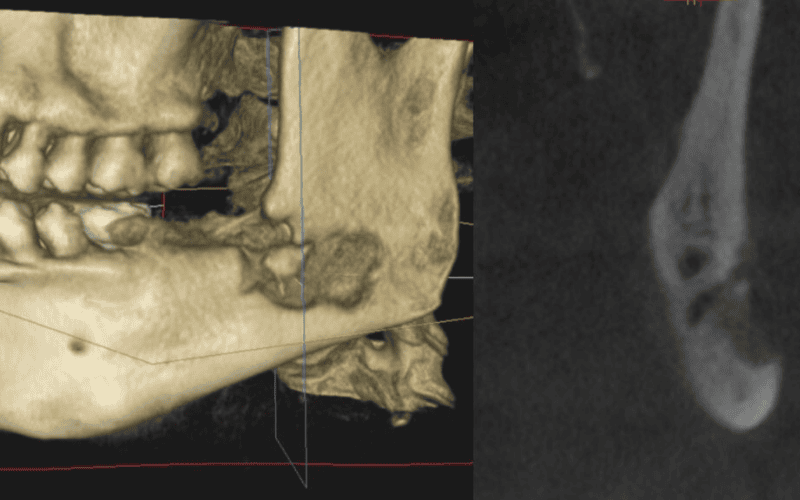
Some wisdom teeth extractions have difficulties, but most go successfully. Understanding these rare side effects can help you plan for recovery challenges. Sharp pain wisdom tooth extraction can sometimes be linked to issues like osteomyelitis or jaw fractures, which need prompt medical treatment.
Post-tooth extraction osteomyelitis is rare but dangerous. It causes localised discomfort, oedema, and fever. It can damage the jawbone and hinder recovery if untreated. Treatment must begin immediately to avoid problems. Contact your dentist for a full exam and treatment if you have these symptoms.
People with weak jawbones or teeth that are highly impacted can break their jaws when they have to have a difficult wisdom tooth removed. If you avoid foods that are too hard or chewy and follow the aftercare instructions, you can lower your risk of jaw strain and fracture. If you have serious jaw pain, you should see a dentist to make sure you heal properly.
After surgery, patients with temporomandibular joint (TMJ) abnormalities may experience jaw joint pain. Jaw pain, stiffness, and clicking are symptoms. Tell your dentist about your TMJ history so they can alter your treatment and recovery strategy to reduce pain.
Factors That Can Increase the Risk of Wisdom Teeth Removal Complications
Some variables raise the likelihood of complications after wisdom teeth extraction, however most are successful. You and your dentist can take precautions for a safer operation and faster recovery by understanding these aspects.
Patient-Related Factors
- Hypertension: Increased blood pressure can delay healing and infection, affecting circulation and blood clotting.
- Smoking: Smoking is a major risk factor for dry sockets and delayed healing due to reduced blood flow and disruption of the healing process.
- Age: Wisdom tooth removal may cause more difficulties in older persons. Younger individuals, especially those in their late teens to early twenties, recover faster and with fewer difficulties.
Tooth and Anatomical Factors
- Wisdom Tooth Position: Impacted or tilted horizontal teeth are difficult to remove and may cause issues during or after extraction.
- Proximity to Nerves: Lower wisdom teeth near the inferior alveolar nerve may cause transient or permanent numbness in the lips, chin, or tongue.
- Proximity to Sinuses: Upper wisdom teeth near sinuses may produce difficulties, such as a small opening between the mouth and sinus (oroantral communication). This usually goes away on its own after extraction, but it may need treatment.
Surgical and Procedural Factors
- Use of Hemostatic Agents: Surgeons can use haemostatic agents to control bleeding. Following aftercare instructions is critical since these medications may increase infection risk.
- Surgeon’s Experience: Experienced surgeons can lessen the risk of problems. Experienced surgeons execute more exact extractions, reducing bleeding, infection, and nerve injury.
- Suturing Technique: Surgeons may utilise primary closure or leave the gum site slightly open for suturing. Proper suturing reduces infection risk and speeds healing.
How to Know If Something Is Wrong After Wisdom Teeth Removal
The first few days after wisdom teeth removal are normal for discomfort, swelling, and bleeding, but it is crucial to recognise when something is wrong. If any of these symptoms worsen, see your dentist immediately.
Signs to Watch For:
- If pain persists despite the dentist’s treatment, it may suggest an issue.
- Heavy bleeding may require care beyond 24 hours, however some bleeding is usual.
- Swelling that worsens after 3 days or lasts beyond a week may indicate infection or other problems.
- If you have other signs as well, a fever may mean you have an infection.
- If you keep getting yellow discharge or a bad taste after using saltwater to rinse, it could mean you have an infection.
- Having trouble breathing or eating could be a sign of a serious problem.
- On days when the swelling lasts longer, you may need more treatment.
- If the extraction site is not healing properly or if the pain lasts longer than expected, you should call your dentist.
- Having trouble opening your mouth after a few days could mean that your jaw is stiff or that you have another problem.
Signs of Infection or Poor Healing at the Extraction Site
One of the worst wisdom tooth removal complications is infection. Tracking your recovery is crucial to optimum healing. More severe pain and swelling may suggest an infection or poor healing. Watch out for:
- If pain worsens or extends to the ear or jaw, it may indicate an infection.
- The gums around the extraction site may appear red, swollen, and warm to touch. Yellow or white pus may leak from the socket.
- A prolonged bad breath that does not improve with saltwater rinses may suggest a bacterial illness.
- A fever or swollen lymph nodes in the neck may indicate an infection.
Wisdom Teeth Recovery Timeline: First 24 Hours to Full Healing
Wisdom teeth removal recovery might vary, but good care can speed up and reduce discomfort. From 24 hours to full recovery, here’s what to expect.
The First 24 Hours
- To keep the blood clot from breaking up, do not rinse, spit, or touch the joint.
- Put cold packs on the outside of your lips for 20 minutes and then take a 20-minute break. Do this every 24 to 72 hours to reduce swelling.
- Follow the directions your dentist gives you for pain medicine. In more serious cases, you might need stronger painkillers than ibuprofen or paracetamol.
- Stick to water and other drinks to stay refreshed, but do not use straws in case your blood clots. Stick to water or cold drinks.
- Stay away from alcohol, coffee, hot drinks, and carbonated drinks to keep the surgery site from getting irritated and to speed up the healing process.
- Rest with your head up to stop bleeding and reduce swelling.
The First Few Days
- Smoking might slow healing and increase dryness risk. Avoid smoking, which slows recovery and increases the chance of painful dry socket.
- Consume soft foods such as smoothies, yoghurt, mashed potatoes, scrambled eggs, and soups. Start with semi-soft foods as you feel comfortable.
- Avoid hard or crunchy foods like seeds, nuts, grains, and popcorn to prevent extraction site blockage and slow recovery.
- Gently rinse with ½ teaspoon of salt in warm water after 24 hours to maintain a clean extraction site and avoid infection.
- Refrain from rigorous activity for 3-4 days to reduce swelling and stress on the surgery site.
The first few days are crucial for managing pain and swelling, but full healing takes weeks to months, depending on extraction complexity. Carefully following your dentist’s aftercare guidelines helps maximise recovery and reduce problems.
Comfort and Care Tips for a Smooth Recovery
After wisdom teeth removal, take care of your body and manage pain to recover smoothly. These tips will help you heal comfortably:
- If your lips feel dry, use balm or cream on them often to keep them from getting irritated.
- If your jaw is stiff (trismus), use warm, wet heat to relax the muscles and ease the pain.
- Getting enough rest is very important for healing. Take some time to heal and get better.
These simple techniques can reduce pain and accelerate recuperation.
When to Contact Your Oral Surgeon After Wisdom Teeth Removal
Some pain and swelling are common after wisdom teeth removal, but certain indicators require professional treatment. If you have any of these symptoms, contact your oral surgeon immediately for medical attention:
- Contact your oral surgeon for further assessment if the pain persists or intensifies after a few days despite advised aftercare.
- Excessive bleeding beyond 24 hours or sensitivity to pressure may suggest a problem requiring quick treatment from your oral surgeon.
- Infection may be indicated by worsening swelling or redness around the surgical region after a few days. Consult your dentist immediately.
- Avoid ignoring continuing or bad smells or disagreeable tastes that do not improve with saltwater rinses.
- Fever or chills after surgery may indicate infection. These symptoms need medical attention now.
- Unusual swallowing or breathing difficulties may suggest a significant concern. If so, seek medical help immediately.
- Consult your oral surgeon for assistance and treatment if your jaw remains tight or difficult to open days after the procedure.
FAQs
How long will the pain last after wisdom teeth removal?
Pain usually peaks within 48 hours and improves over many days. Most discomfort should subside after the first week. Consult your oral surgeon if pain intensifies.
Is swelling normal after wisdom tooth extraction?
Yes, swelling is common and peaks within 2-3 days. Use cold packs and elevate your head to minimise swelling. If swelling remains after the first several days or grows worse, visit your oral surgeon.
When should I be concerned about bleeding after wisdom teeth removal?
The first 24 hours may include some bleeding. If bleeding persists or does not cease with pressure, a problem may exist. Consult your oral surgeon for instructions.
What are the signs of dry socket?
When the extraction site blood clot melts too soon, dry socket ensues. Sharp pain in wisdom tooth extraction site, a bad taste, or an empty socket are symptoms. Call your dentist immediately if you have these symptoms.
How can I avoid infection after wisdom teeth removal?
Keep the extraction site clean with saltwater rinses per your dentist’s aftercare instructions to avoid infection. Fever, pus, or increasing discomfort indicate infection; consult your oral surgeon immediately.
How long will it take for my jaw to fully heal after wisdom teeth removal?
Extractions vary in complexity and healing time. Most patients heal within weeks, but jaw stiffness and discomfort may last months. Follow-up visits and aftercare instructions can help you recover.
Can I smoke after my wisdom teeth are removed?
Smoking slows healing and increases dry socket risk. To maximise healing, avoid smoking for at least 48–72 hours following your treatment and ideally during recovery.




